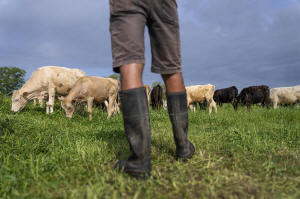Eat grass-fed beef, help the planet? Research says not so simple
[March 18, 2025]
By MELINA WALLING
For cattle fattened in fields instead of feedlots, the grass may be
greener, but the carbon emissions are not.
A study out Monday in the Proceedings of the National Academy of
Sciences finds that even in the most optimistic scenarios, grass-fed
beef produces no less planet-warming carbon emissions than industrial
beef. The finding calls into question the frequent promotion of
grass-fed beef as a more environmentally friendly option. Still, other
scientists say grass-fed beef wins out on other factors like animal
welfare or local environmental pollution, complicating the choice for
conscientious consumers.
“I think that there is a large portion of the population who really do
wish their purchasing decisions will reflect their values,” said Gidon
Eshel, a research professor of environmental physics at Bard College and
one of the study's authors. “But they are being misled, essentially, by
the wrong information.”
When it comes to food, beef contributes by far the most emissions
fueling climate change and is one of the most resource- and
land-intensive to produce. Yet demand for beef around the world is only
expected to grow. And carefully weighing the benefits of grass-fed beef
matters because in most parts of the world where beef production is
expanding, such as South America, it’s being done by deforesting land
that would otherwise store carbon, said Richard Waite of the World
Resources Institute.

Experts say this study's finding makes sense because it's less efficient
to produce grass-fed cattle than their industrial counterparts. Animals
that are fattened up in fields instead of feedlots grow more slowly and
don't get as big, so it takes more of them to produce the same amount of
meat.
The researchers used a numerical model of the emissions produced across
the process of raising beef, then simulated many herds of industrial and
grass-fed cattle. It compared differences in how much food they would
eat, how much methane and carbon dioxide they would emit and how much
meat they would produce. Those differences mirror real-life scenarios;
cattle in arid New Mexico and lush northern Michigan have different
inputs and outputs.
Eshel and his team also analyzed previous studies that examined how much
cattle grazing promotes carbon storage, but found that even in the
best-case scenarios, the amount of carbon that grasses could sequester
didn’t make up for the emissions of the cattle.
[to top of second column]
|

Cattle graze on a ranch in Lufkin, Texas, April 18, 2023. (AP
Photo/David Goldman, File)
 Randy Jackson, a professor of
grassland ecology at University of Wisconsin-Madison who was not
involved in the study, said he has found similar results in his own
research showing that grass-fed beef has higher emissions assuming
the same demand. In fact, Eshel's team cited his work. But he
worries that the study is too focused on minimizing emissions
“without concern for the environmental impacts beyond GHG load to
the atmosphere,” like biodiversity and soil and water quality, he
wrote in an email.
The American Grassfed Association, a nonprofit membership group for
producers of grass-fed livestock, did not immediately provide a
comment on the study.
Jennifer Schmitt, who studies the sustainability of U.S.
agricultural supply chains at the University of Minnesota and also
wasn't involved in the study, said she thinks the paper “helps us
get a little closer to answering the question of maybe how much beef
should we have on the landscape versus plant proteins,” she said.
Schmitt said maybe if beef was scaled back on a large enough scale
and if farmers could free up more cropland for other foods that
humans eat, the localized environmental benefits of grass-fed cattle
could make up for the fact that they come with higher emissions.
It would be harder to convince Eshel, however. He thinks climate
change is “second to none” when it comes to global problems and
should be prioritized as such.
“I have a hard time imagining, even, a situation in which it will
prove environmentally, genuinely wise, genuinely beneficial, to
raise beef," Eshel said.
For consumers who truly want to be environmentally conscious, he
added, "don't make beef a habit."
All contents © copyright 2025 Associated Press. All rights reserved |